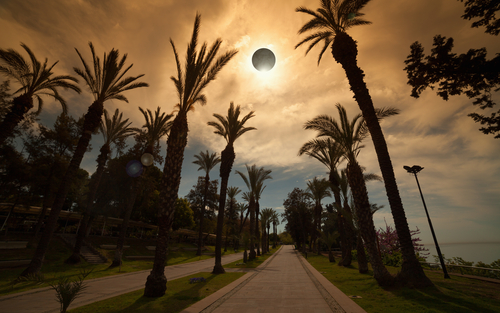
In an unprecedented move that underscores the importance of preparedness and public safety, Indiana Governor Eric Holcomb has declared a statewide disaster emergency in anticipation of the total solar eclipse scheduled for April 8, 2024. This decision, rooted in foresight and responsibility, positions Indiana as a leader in emergency management, setting a commendable example for states across the nation.
As the celestial event draws near, the Hoosier state is bracing for an influx of hundreds of thousands of visitors, eager to witness a spectacle that last graced Indiana skies in 1869. The expected surge in population, while a boon for local economies, presents significant challenges to the state's critical infrastructure systems, including communication, emergency response, and transportation networks.
DO YOU
BELIEVE
THE ECLIPSE
IS
FULFULLING A PROPHECY? pic.twitter.com/luNN1RoyHy— DR. Kek (@Thekeksociety) March 27, 2024
Recognizing the potential for "widespread and significant impact," Governor Holcomb's order empowers the Department of Homeland Security (DHS) to lead a coordinated effort among local, state, and federal agencies. This proactive approach ensures that Indiana is not only prepared to host a memorable event but also equipped to maintain safety and order amidst the excitement.
The declaration also activates the Emergency Management Assistance Compact (EMAC), a national mutual aid system that facilitates resource sharing among states. This strategic move by Governor Holcomb highlights the value of interstate cooperation in managing large-scale events, ensuring that Indiana can access additional equipment and communications systems to support the eclipse-related surge in tourism.
PROPHECIES BEING FULFILLED EVERYWHERE 👀
With the coming eclipse, the strange circumstances regarding the moon, and the host of other prophetic occurrences – we now add that red heifers have been born and will be sacrificed soon
Christians, what are your thoughts? pic.twitter.com/IPLfF51PSM
— American Archer (@CalenArcher) March 27, 2024
This isn't the first time Governor Holcomb has utilized disaster declarations to protect Hoosiers. His administration's adept handling of the COVID-19 pandemic through similar orders demonstrated a commitment to public health and safety.
Despite past tensions with state lawmakers over the extent and duration of such orders, the current declaration enjoys broad support, given its clear focus and timely conclusion set for April 9, the day after the eclipse.
Indiana's preparedness efforts are part of a larger national narrative, as regions across North America gear up for the solar eclipse. From Niagara Falls, Canada, to several counties in Texas, local governments are issuing their own emergency declarations, citing concerns over traffic congestion, public safety communications, and critical infrastructure. These collective actions underscore the significance of the event and the universal need for readiness.
As the countdown to the solar eclipse continues, Indiana stands out for its leadership and comprehensive planning. Governor Holcomb's decisive action not only safeguards the well-being of both residents and visitors but also serves as a model for effective emergency management. As communities across the country look to Indiana, they see a shining example of how proactive governance can turn a potential crisis into an opportunity for unity, celebration, and shared experience.











